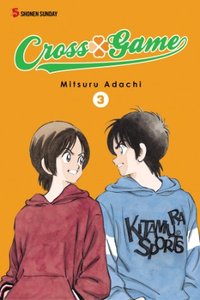RIGHT TURN ONLY!!
Sign of the Cross
by Carlo Santos,

Ah, springtime! A time when another new anime season is upon us. But also a time when the new Tokyo Youth Ordinance Bill is upon us. Now if only there were a way to regulate the harmful content that comes out of politicians ...
CLEAN-FREAK FULLY EQUIPPED

Vol. 1
(by Touya Tobina, Tokyopop, $10.99)
FROM THE BACK COVER:
"After a traumatic childhood experience at an amusement park, Sata Senda became the local poster boy for compulsive cleanliness. Equipped with anti-bacterial spray, an array of masks and kind of scary protective clothing, he's not exactly easy to get close to, and he's fine with that ... at least until Anna Aiuchi, the class cutie, goes out of her way to break through his personal bubble! Suddenly Senda's life begins to change, invaded by one messy personality after another. Can the cleansing power of friendship finally overcome Sata's quirks? Find out in the first volume of this hilarious new comedy!"
EVIDENCE FOR:
Man, someone needs to stop Tokyopop before they corner the market on ornery yet lovable lead characters! Clean-Freak introduces yet another personality-disordered protagonist—this time an obsessive-compulsive germaphobe—and somehow manages to sculpt him into an endearing, soft-hearted fellow. At first, the reader's perception of Senda matches that of his classmates, seeing him as a sterile-suited nutcase who avoids others. But subtly, oh so subtly, Senda's personality warms up as he meets those who are willing to give him a chance. In the end, it's those interactions—with eternally optimistic Anna, neurotic and hyperactive Yui, scheming temptress Yumeno, even the kid who's in charge of the school animals—that shape Senda's character and give the whole series an aura of warmth and friendship. Of course, the sense of humor doesn't hurt either, with Senda's arsenal being a whimsical reminder of Japan's incredibly advanced hygiene techniques. And the storyline achieves just the right balance by sprinkling in a few moments of tenderness: Senda and Anna's long-distance letters to each other, his dauntless effort to save the school rabbit, and the obligatory adorable childhood flashback. As a quirky chronicle of youth this series is indeed fully equipped.
EVIDENCE AGAINST:
Although it brims with heart and soul, this volume clearly has some beginner's jitters to overcome. Is anyone surprised that the first chapter won an award as a one-shot and was only picked up for serialization later? That's probably why Anna suddenly moves abroad in Chapter 2, thus cutting the legs off of what would have been a very promising relationship in the series. And the episodic nature of Senda's escapades—meet a new schoolmate, learn to accept each other, repeat as needed—results in a structure where his character develops, but the actual story itself does not. It's just one slice of school life after another, which doesn't make for terribly compelling drama. This series' biggest faults, however, lie in the art, which is mediocre or worse in just about every aspect—the character designs are ordinary, the backgrounds consist of basic school interiors or screentoned messes, and the layouts often fall victim to the rookie mistake of trying to squeeze too much action onto a single page. In short, it looks like every typical school comedy out there—which does a great disservice to the decidedly non-typical characters.
FINAL VERDICT:
The weak spots aren't that damaging, are they? Although a bit sloppy to start out, it carries enough promise for a C+.
CROSS GAME

Vol. 3
(by Mitsuru Adachi, Viz Media, $14.99)
FROM THE BACK COVER:
"It's time for Ko and the other misfit Portables to either put up or shut up. If they lose against the varsity players, they'll be kicked off the baseball team forever. But will a newbie like Ko be good enough to take on an elite squad of recruits?!"
EVIDENCE FOR:
Let all the other eggheaded bookworms gush about how well Cross Game does coming-of-age drama. I'm here to gush about how well Cross Game does baseball! Not only is the series emotionally real, but its sports element also rings true, with every pitch, every play, and every strategic move a believable part of the game. That's why this volume's wager match between the varsity squad and Ko's misfits is so gripping—because, deep in your heart, you really can believe that there's this high school phenom pitching out of his mind to save his team from a pack of overhyped bullies. Even with only static imagery at his disposal, Mitsuru Adachi draws a perfect picture of the game's intensity: fastballs that seem to zip by at nine-tenths the speed of light, split-second plays on the basepaths, and emotions roiling in the dugout. Yet he also captures the subtle beauty of summer, with trees in full foliage and harsh shadows across the field. The only thing more beautiful, of course, is the range of personalities coming together—Ko's competitive spirit, Aoba's stubbornness, even slugger Azuma's prickly attitude. In short, Cross Game succeeds both on and off the field.
EVIDENCE AGAINST:
That thrilling, brilliant game between the big boys and the underdogs? It's only about half the book. The rest of it is, sad to say, slice-of-life filler material—not terrible by any means, but still just placeholder chapters to keep folks interested during the offseason. Ko's growth as a baseball star and as a young man is put on hold in favor of silly asides like shortstop Senda learning the meaning of friendship, or the glamour-girl team manager trying out for a movie role, or Aoba getting the best of her male admirers when she makes plans for a rather unorthodox "date." Adachi even pads out a couple of early chapters with some swimming pool-related fanservice, which probably would have been all right if it weren't for the fact that everyone knows he's better than that. At least there's still a sprinkling of humor to stop these episodes from falling completely flat, but even that has a way of backfiring on itself with a lot of awkward, self-referential fourth-wall material ("The narrator is embarrassing! And he doesn't submit his chapters on time"). Come on, when do they start playing real games again?
FINAL VERDICT:
The filler chapters are, at worst, average. The all-or-nothing game, meanwhile, is great! Do the math and it's clear to see why this volume picks up an A- overall.
DEADMAN WONDERLAND

Vol. 4
(by Jinsei Kataoka and Kazuma Kondou, Tokyopop, $10.99)
FROM THE BACK COVER:
"The week of the annual prison inspection is eventful, as both Prison Warden Makina and the resistance group Ganta finds himself in, have big plans. Makina wants to uncover the truth behind Tamaki's rule. Ganta's new friends, however, have an even more ambitious plan: an all-out Deadman Wonderland prison break!"
EVIDENCE FOR:
That's right, it's time for Deadman Wonderland: Prison Break Edition! Having already established a baseline for hot-blooded violence and jaw-dropping twists, Volume 4 pushes it to the next level, with a classic race against time as Ganta and company try to outwit their captors—as well as fend off a sinister task force known as the Undertakers. That third-party intrusion is just one of the many surprises lying in wait—there's also a mole in the system, an unexpected antagonist (never underestimate the cute ones!), and multiple twists of fate that seem bizarre at first but make total sense after a chain of dramatic reveals. In short, if your eyes and mouth don't widen by an inch and a half after witnessing the events of this volume, you may want to get your pulse checked. Even matters of the heart have a way of stopping one's breath—Ganta turning against Shiro after being betrayed, or the despair of a brilliant plan falling short. The daredevil artwork also adds to the story arc's impact, with skewed perspective, theatrical character poses, and fast-paced layouts executed in perfect rhythm. As an action masterpiece, this one hits hard.
EVIDENCE AGAINST:
In an effort to showcase how dramatic and explosive everything has gotten, Deadman Wonderland loses some of that deep, internal desperation that once possessed Ganta when he first arrived. This volume is framed not so much as a "him against the world" battle, but more of an "us versus them" battle, with our lone hero lost among the crowd of all the different participants. Great stories should focus on characters, not schemes and battles, and that's where this one falters by choosing the latter. Yet the deal is even worse for Shiro, the mysterious yet likable girl who is basically told to go hide in her room for the duration of the prison break ... and then only emerges when needed to set off a lucky string of coincidences. That's not clever storytelling, that's just cheap. Meanwhile, the other attempts to be clever—an explanatory flashback here, a jigsaw-piece plot point there—may only serve to send readers scrambling through previous pages in order to make sense of it all. Clearly, Kataoka and Kondou need to work on making their insane 180-degree story twists easier to follow.
FINAL VERDICT:
This one tries a little too hard in its quest for greatness, and the despite the glorious chaos and dramatic turnarounds, manages just a C.
ITSUWARIBITO

Vol. 2
(by Yūki Iinuma, Viz Media, $9.99)
FROM THE BACK COVER:
"Utsuho's truthfulness as a child resulted in an enormous catastrophe, and he decided to lie from that day forward. Raised in a village of orphans by a monk, Utsuho is an unrepentant troublemaker. The monk eventually inspires him to help people, but there's no way Utsuho's going to lead an honest life! Instead, he's going to use his talents for mischief and deception for good!
In the forest, Utsuho, Dr. Yakuma and the talking tanuki Pochi encounter a psychotic man who hunts liars and cuts out their tongues. How can Utsuho outwit someone who can psychically tell when someone's lying?"
EVIDENCE FOR:
The stakes are raised significantly in Volume 2 of Itsuwaribito, which graduates from trivial challenges like lying contests and puts Utsuho's trickster skills through some real tests. Nothing gets the blood pumping quite like seeing the hero in mortal peril—and when you've got a needle-shooting paranoiac about to puncture you full of holes, well, the only thing more exciting is seeing how Utsuho pulls himself out of it. The adventures in the second half of the book, meanwhile, contain even more surprises: an entire island populated by liars, a village whose inhabitants must protect themselves from said liars, and Utsuho actually falling victim to a trick for the first time ever. (Or did he...?) And for all the Entertainment One gets out of the furious fight scenes and colorful characters, it's still the brain-teasing true-or-false guesswork that makes the series so much fun. Shonen battle tactics take a decidedly unconventional turn when Utsuho is constantly flip-flopping between what he says, what he means, and what he does. The carefully detailed backgrounds and outfits also show strong attention to detail in capturing the ambience of the feudal era.
EVIDENCE AGAINST:
Just because weekly manga chapters are really short doesn't mean that story arcs are allowed to start and finish wherever they like. Volume 1 of this series ended on an oddly placed cliffhanger, and now this one cuts off practically in the middle of a dialogue scene—which might be good for keeping readers in suspense, but absolutely wrecks the rhythm of a storyline. Another similar effect also occurs when the end of one arc and the start of another suddenly happen mid-chapter. It's just weird, disorienting pacing, and makes it look like the plot is controlling Yūki Iinuma instead of the author being in control of the plot. Then there's the stuff that's not actually disorienting, just disappointing: in battle Utsuho, repeatedly uses the same trick, basically throwing poison at a foe and then lying about what it actually is. Come on, where's the creativity? Surely an expert liar would change up his techniques so that his untruths don't become predictable. Creativity is also absent in the character designs and fight choreography, most of which look "good enough" but lack a distinctive quality to set them apart from other, similar series.
FINAL VERDICT:
Despite some moments of action and intrigue, the brilliant mind games are quickly giving way to poor story planning and endless fight scenes ... which means it had better find a way to pull itself out of a C- rut.
TWIN SPICA

Vol. 6
(by Kou Yaginuma, Vertical, $10.95)
FROM THE BACK COVER:
"Asumi and her classmates' cross-country ordeal comes to an end, but it's far from their last challenge as they're quickly reminded. Meanwhile, one of the gang starts skipping class."
EVIDENCE FOR:
Even at six volumes in, Kou Yaginuma can't help but bring new characters into the world of Twin Spica—but as always, each one is connected to the main cast by a carefully woven emotional thread. This time it's Haijima, a former classmate of Asumi's dad whose aloof demeanor belies a bittersweet back-story. Despite being whisked in and out of the story within a single chapter, Haijima adds another facet of humanity to the many lives affected by the Lion disaster. But even the series' regulars reveal new truths about themselves that touch the heart: why Suzuki has to overcome financial hardship despite being the son of an aristocratic family, for example, or—in a side story—how a young Asumi and her elementary-school classmate learn to cope with death. There is, of course, also the usual quota of inspiring space-school accomplishments like the finale to the outdoor survival challenge, plus a valuable lesson about the challenges of in-flight maintenance. The subtle hatching and delicate lines of Yuginuma's art allows the reader to be pulled gently into every scene—whether it's grand double-page spreads of the sky, rugged wilderness exploration, or the simple beauty of friends commiserating together.
EVIDENCE AGAINST:
Whereas the last couple of volumes were so powerful and revealing in the stories they told—the details of Mr. Lion's childhood, the terrible truth about Marika—this one seems content to let various storylines dangle without any resolution. Marika's bizarre situation, for example, has been implied quite clearly since the middle of Volume 5, yet this one just continue to drop the same old hints (the pills, the blood) and never advances to that crucial next step where Asumi and friends finally figure it out. Mr. Lion comes close to revealing it, but ... apparently Yaginuma thinks he can get away with holding back on a major plot point for as long as possible until everyone throws their hands up in exasperation. Meanwhile, the storylines that do resolve—like Haijima's chapter—are interesting but not essential to the storyline. Plus another 30 pages blown on a childhood side story? Why not spend those flashbacks on events that actually fill in major details about the characters' lives? In addition, the overly simple character faces don't really convey the level of expression that this kind of story needs.
FINAL VERDICT:
It may not pierce the heart as effectively as story arcs that came before, but there's still enough warmth and character to this volume to earn a B.

PUELLA MAGI MADOKA MAGICA

Vol. 1
(by Magica Quartet and Hanokage, Houbunsha, ¥657)
FROM THE ENCYCLOPEDIA:
"After experiencing a bizarre dream, Madoka Kaname, a kind 14-year old girl, encounters a magical creature named Kyubey. Madoka and her friend Sayaka Miki are offered the opportunity of gaining magical powers if they agree to make a contract with the strange little being. He will also grant them one wish, but in exchange they shall risk their lives by accepting the responsibility of fighting witches. Invisible to human eyes, witches are catalysts of despair in the areas they inhabit. An ally of Kyubey, a magical girl named Mami Tomoe, befriends and encourages the two girls to accept the contract. For an unknown reason, another magical girl named Homura Akemi is determined to prevent Madoka from accepting the deal."
EVIDENCE FOR:
Upon seeing a super-generic title like "Magical Girl Madoka," one might ironically guess that this series is actually about subverting magical-girl clichés—which it does, in many sly ways. Is Chapter 1 a prefabricated origin story about Madoka gaining her powers? Of course not! Does Madoka develop a long and fulfilling friendship with kindly mentor Mami? Ooh, think again. The manga storyline stays faithful to the concurrently running anime, meaning that even the slim first volume is packed with dramatic twists like the notorious Mami incident (which is just as shocking in black-and-white) and the emotional fallout that comes afterwards. In fact, the silence of Madoka walking through an empty apartment—as well as other introspective displays of emotion—works even better on paper than on screen, as this medium allows the reader to get deeper into the character's thoughts. Even the enigmatic behavior of animal mascot Kyubey radiates a strange sort of charm. The artistic highlights are clearly the dreamworlds where the magical girls do battle, with surreal imagery and dizzying backgrounds creating a unique clash of good versus evil. But even then, it's the moral gray areas that really pull you in ...
EVIDENCE AGAINST:
It's usually a good thing for a manga to stay true to its source, especially when that source is a powerful, story-driven anime—but that also means dragging along the show's faults with it. These early chapters of Madoka Magica are full of vague musings and statements seemingly uttered into thin air (although anyone who's seen far enough ahead will understand the significance of those statements). Still, a work should be strong enough to stand on its own, and saying "you'll get it once you see the anime" is no excuse for wishy-washy, pseudo-philosophical ramblings. The manga's strict adherence to the TV script also results in some rushed pacing, where the girls jump from one event to the next out of obligation rather than as a natural progression of events. That, in turn, lessens the emotional impact of certain plot points. The manga's greatest weakness, though, is basically the artist's fault: the linework in most scenes is barely functional, with sparse or non-existent backgrounds, a moe-by-numbers approach to the character designs, and an overall look that suggests a computer clipart program could have done it. Now is that the impression the Madoka manga truly wants to leave behind?
FINAL VERDICT:
It may be inferior to the source material, but is still strong enough to be worth a look—firstly for the way it overturns the traditional magical girl premise, and then for the many surprises that come afterward.

Do you want to be one of those cool people who follows the latest season of anime and says, "I've read the manga so I know what happens next"? Well, here's a series to keep your eye on before it hits Japanese airwaves this summer! Guest writer Eva Lopez analyzes bit by bit what makes this particular slice-of-life drama so great.
And to all prospective contributors, don't forget that Reader's Choice is not only a place to send in reviews about your favorites, but also to warn others about series you really, really hate! So let the negativity spew forth ... if you dare.
BUNNY DROP

Vol. 1
(by Yumi Unita, Yen Press, $12.99)
This is a great story that throws a thirty-year-old into the frenzy called adulthood when he unexpectedly decided to take in a six-year-old. Seen how an adult, who acts like a child, and a child, who acts like an adult take in their respective roles has to count for something!
So first of all, let's begin with the synopsis:
Going home for his grandfather's funeral, thirty-year-old bachelor Daikichi is floored to discover that the old man had an illegitimate child with a younger lover! The rest of his family is equally shocked and embarrassed by this surprise development, and not one of them wants anything to do with the silent little girl, Rin. In a fit of angry spontaneity, Daikichi decides to take her in himself! But will living with this overgrown teenager of man help Rin come out of her shell? And hang on, won't this turn of events spell doom for Daikichi's love life?!
Story
The story is amazing and truly touching. The fact that Yumi Unita touches on topics about death, divorce, parenthood, and responsibility in a serious manner while throwing some silliness at the side is great.
Main Characters:
Daikichi
The story revolves around Daikichi, who apparently thinks that the opposite sex is his enemy. Who works in a 9-5 job with lots and lots of overtime. Who has been carefree and lacks responsibility (which of course is hinted by his family members). And who, as volume one progresses, begins to slowly become an adult. But truth be told, I just think he's misunderstood.
Rin
Rin is the oddball; the six-year-old that is too tall for her age and too shy to speak. Well that's how the family sees her. But as she begins to live with Daikichi, not only he, but us as well, were able to see that she is a lot more responsible then Daikichi is. In a way, she balances him. I guess she is the adult and Daikichi is the little kid, a role reversal.
Grandpa
There isn't much at the moment. I know, he's dead, but I feel like there might be more... like if he is surrounded by mystery, so definitely something to look forward to!
Other Characters
I don't want to go on detail about them (for now), but Daikichi's family is definitely in the loop. At the beginning of the novel, you can't help but feel annoyed by them, but by the end of this volume, they are, kind of, okay...
Comments
Definitely something worth adding to any manga collection, and the fact that we see how a child, who acts as an adult, and an adult who acts like a child begin taking their respected roles; makes us ask for more.
Is there a hidden gem of manga you'd like to reveal to the world? Is there a piece of garbage that deserves to be bashed in public? Or is there a title that didn't get a fair grade here, and you want to set the record straight?
Now's YOUR chance to be the reviewer! Write a review of about 300-400 words (a little more or less is fine) and include:
- your name.
- Title of manga (and volume no., if applicable)
- Author/Artist
- Publisher
- Briefly describe the story, then explain why this manga is great, terrible, or in between. Be objective, but also be entertaining.
Then send it in to rtoreaders (at) gmail (dot) com (plain text format preferred). One review will be selected out of all the submissions and will be published in the next column. All types of manga and manga-inspired comickry are accepted, from past and present, from Japan and beyond—what matters is that it's the Reader's Choice! NOTE: Submissions may be edited for formatting and grammar.
discuss this in the forum (12 posts) |